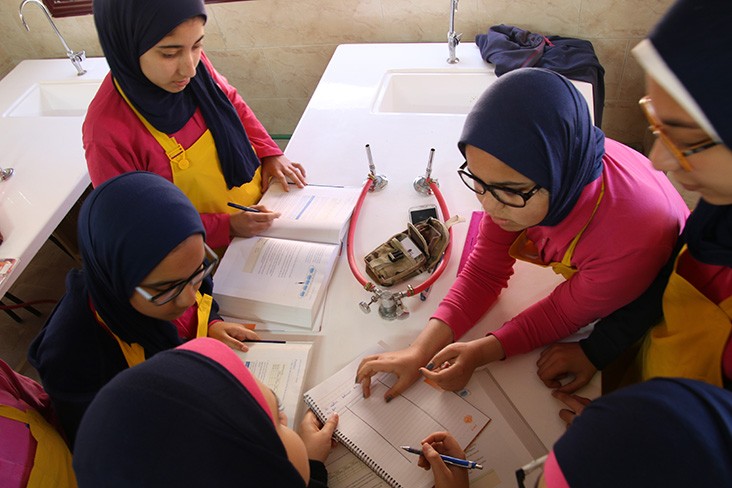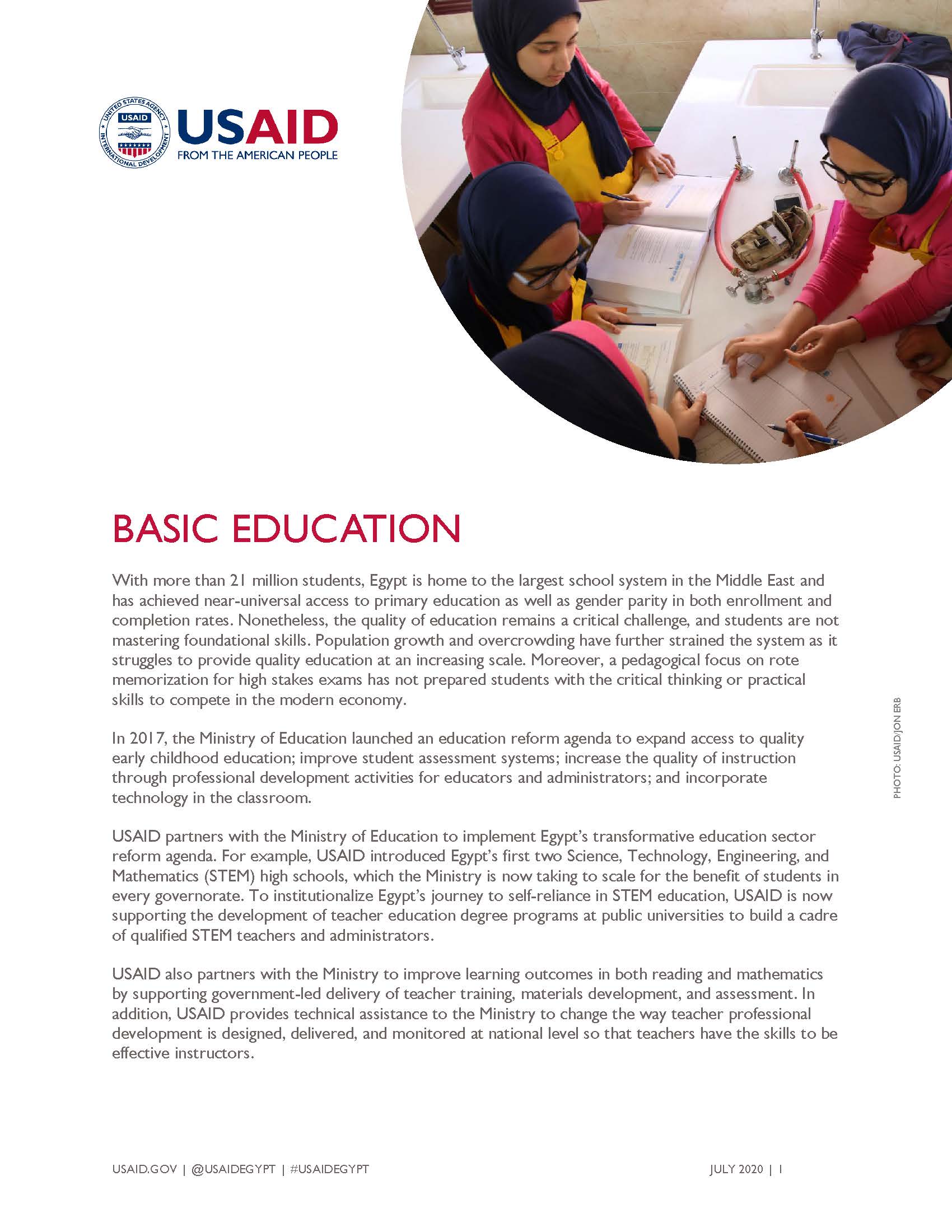Speeches Shim

Overview
With more than 21 million students, Egypt is home to the largest school system in the Middle East and has achieved near-universal access to primary education as well as gender parity in both enrollment and completion rates. Nonetheless, the quality of education remains a critical challenge, and students are not mastering foundational skills. Population growth and overcrowding have further strained the system as it struggles to provide quality education at an increasing scale. Moreover, a pedagogical focus on rote memorization for high stakes exams has not prepared students with the critical thinking or practical skills to compete in the modern economy.
In 2017, the Ministry of Education launched an education reform agenda to expand access to quality early childhood education; improve student assessment systems; increase the quality of instruction through professional development activities for educators and administrators; and incorporate technology in the classroom.
USAID partners with the Ministry of Education to implement Egypt’s transformative education sector reform agenda. For example, USAID introduced Egypt’s first two Science, Technology, Engineering, and Mathematics (STEM) high schools, which the Ministry is now taking to scale for the benefit of students in every governorate.
To institutionalize Egypt’s journey to self-reliance in STEM education, USAID is now supporting the development of teacher education degree programs at public universities to build a cadre of qualified STEM teachers and administrators.
USAID also partners with the Ministry to improve learning outcomes in both reading and mathematics by supporting government-led delivery of teacher training, materials development, and assessment. In addition, USAID provides technical assistance to the Ministry to change the way teacher professional development is designed, delivered, and monitored at national level so that teachers have the skills to be effective instructors.
USAID/Egypt Fact Sheet: Basic Education ![]() (pdf - 206k)
(pdf - 206k)
Activities
STEM TEACHER EDUCATION AND SCHOOL STRENGTHENING: This activity supports the introduction of STEM pre-service teacher education and degree programs in five Egyptian public universities. As a result, teachers specializing in STEM education are now prepared to elevate the quality of teaching and learning in STEM secondary schools. In addition, the activity provides technical assistance to the Ministry of Education to deliver in-service training for STEM teachers and administrators. Implementing Partner: 21PSTEM; Life of Project: April 2018 – April 2023; Total Estimated Cost: $24.27 million; Governorates: Nationwide
FABRICATION LABORATORIES FOR STEM SCHOOLS: This activity supports quality education by providing biology, chemistry and physics laboratory equipment to STEM schools and offering training in supply maintenance and equipment use. Implementing Partner: Transcentury Services; Life of Project: December 2017 – June 2021; Total Estimated Cost: $4.47 million; Governorates: Beni Suef, Qena, Qaloubiya, Sharqia, Sohag, Minya, Fayoum, Menufia
EARLY GRADE LEARNING: This government-to-government activity supports the Ministry of Education to implement its reform agenda for early grade learning. It builds on previous USAID programming to ensure that Egyptian students are able to learn reading, writing, mathematics, and English by the end of grade three as well as remedial learning for students in grades 4-9. The activity will reach over 150,000 teachers and 7.2 million children in grades 1-9 in 17,000 schools nationwide. This partnership is strengthening the Ministry of Education’s ability to provide demand-driven early grade teacher training and to implement decentralized planning and budgeting based on local needs and opportunities. Implementing Partner: Ministry of Education; Life of Project: September 2017 – September 2021; Total Estimated Cost: $15 million; Governorates: Nationwide
TEACH FOR TOMORROW: This activity supports the development and retention of high-quality teachers by equipping the Ministry to design, deliver, and monitor a professional development system for primary school teachers. In collaboration with the Ministry, Teach for Tomorrow develops high-quality “blended” teacher training packages that include face-to-face and technology-based training. It is also developing a teacher certification and licensure model and an incentive structure that rewards teachers based on their performance in training and in classrooms. Implementing Partner: Education Development Center, Inc.; Life of Project: June 2020 – May 2024; Total Estimated Cost: $15.8 million; Governorates: Nationwide (phased roll-out)
LITERATE VILLAGE: Literate Village reaches 1,447 economically disadvantaged villages in underserved areas of the country with high rates of illiteracy among mothers and low school attendance rates among children. Using an intergenerational approach, Literate Village establishes community schools for children and adult literacy programs for their mothers to foster a culture of reading. The activity engages community associations and local leaders to promote reading across a dynamic network of local actors. Implementing Partner: Save the Children Federation, Inc.; Life of Project: March 2017 – March 2021; Total Estimated Cost: $17 million; Governorates: Assiut, Beheira, Sohag



Comment
Make a general inquiry or suggest an improvement.